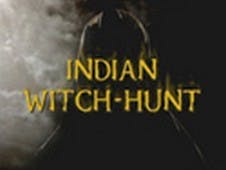Silence please ! Witch hunt in progress
Jan 21, 2015
Story


Violence against women:
Violence against women has been called as "the most pervasive yet least recognized human rights abuse in the world." This persistent and universal problem occurs in every culture and community of the world and according to the statistics, at least one in every three women has been beaten,coerced into sex,or otherwise abused in her lifetime- most often by someone she knows, including member of her own family.
Violence against women is often known as 'gender based violence' because it partly stems from the unequal /inferior status enjoyed by women in society, over the years. Male dominated societies and institutions have long been inflicting both physical and psychological harm on a woman because of her gender.
According to Beijing Declaration and Platform for action -"violence against women both violates and impairs or nullifies the enjoyment by women of their human rights and fundamental freedoms." Crimes are many, but the victim remains the same-silent and suffering women.
Witch hunt in India:
In my country, cases of belittling a woman's honor and dignity are many,sometimes so disturbing and hurtful, that it puts the entire human race to shame.But such stories need to be told. Such stories need to be heard.
Among such innumerable cases, one heinous crime which needs to be highlighted more is the hunting and branding of women as witches and torturing them in the name of traditional practices.
Sarla Brahma,52, Bifula Narzary,49,Purni Basumatary,57, were all victims of horrendous medieval superstitions called Witch Hunting. A couple of months ago, these women were hacked to death by their own fellow villagers in Assam's Kokrajhar district. The reason? They were all suspected of practising witchcraft.These are not the isolated cases, as states such as Jharkhand,Haryana,Chhattisgarh,Orissa,West Bengal,Madhya Pradesh,Rajasthan,Andhra Pradesh,Gujarat,Maharashtra and Bihar have all recorded a rise in cases of witchcraft and witch hunting.
As an outsider, many would find it difficult to believe that in such day and age, witchcraft still exists, but the fact remains that in India, it not only exists, but is also practiced by many, who still believe it to be a part of their tradition.
In the case of Budhaniya Majhi,a simple village girl of Jharkhand, the malaise of witch hunting gets particularly highlighted. On being branded as a "Dayan" ( witch in Hindi ) by the villagers,she was dragged naked the entire night by two men, suffering beatings and lashings throughout, and then made to stand in front of her "village headman", to explain her position. When the headman, who acted as the judge,asked the men of any proof whether Budhaniya was a witch, one of the them answered that his father had fallen ill and died shortly after consuming food Majhi had prepared for him.
He further added that when his father died,a black cat had crossed the threshold of his house.Hence it became clear to him that it was black magic alone that killed his father and Budhaniya was the one who perpetrated this act. Without hearing Majhi's side of the story, the entire village started chanting the name"dayan" and insulted her furthermore.She was told to vacate her house, her belongings and few animals that she had left. She was ordered never to return to the village and was forced to give up her land and house as compensation to the man whose father had died. She was left lifeless.
Such incidents of extreme humiliation and torture are many, where in majority of the cases, the accused woman is either forced to abandon her home and family, or is driven to commit suicide.Most of the cases are not documented because it is difficult for the illiterate woman to travel from far, isolated regions to file police reports and the complaints fall on deaf ears.
According to a study by the Free Legal Aid Committee, in Jharkhand,less than 2% of those accused of witch hunting are actually convicted. A 2010 estimate places the number of women killed as witches in India at between 150-200 per year, or a total of 2,500 in the period of 1995 to 2009 with numbers rising in the recent years.
The Cause and what the Law says:
In India, labelling a woman as a witch is a common ploy to grab land,settle scores, avenge personal rivalry, curb social and economic empowerment or even to punish her for turning down sexual advances.Many a times, due to lack of knowledge, the tribal men tend to belief that the cause of rampant diseases, widespread in the village, is the work of a witch. Accordingly, innocent women are branded and condemned with brutal treatments meted out to them. Some are gang raped, paraded naked, while others are forcibly made to drink powerful poisonous concoctions.Urine and human excreta is used for smearing their already bloodied faces and she is left helpless, with no family or home.
Fortunately, now there seems to be some light at the end of the tunnel.People are slowly waking up to the ill effects of such dastardly acts and coming together to help innocent victims.
In tea plantations of Jalpaiguri, West Bengal, where cases of witch hunting are reportedly high,a small group of women have come together through a government loan programme, and started life afresh.Through the programme, each woman has been issued a low interest,collateral free "microcredit" loan of about Rupees 750 ($18) to start her own business.These women have come together to help each other out in basket weaving, tailoring and selling chicken eggs thus empowering themselves economically and also forcing the men to look beyond the aspect of witch hunting and killing.
Other states like Chhattisgarh and Jharkhand have also laid down strict regulations to control such practices but the absence of any National Law in the country makes the efforts futile. Police and social activists have time and again pressed for a separate and stricter law, but the authorities have pushed the matter under the carpet stating it is a states' responsibility. The ensuing battle of Central v/s State continues, with many victims getting tortured and beaten every day.
Rehabilitation and What More Can Be Done:
As the laws fail to make a greater impact, rehabilitation of the victim seems another possibility of ensuring that their life is not gone wasted. Similar to Jalpaiguri, many other activists and social groups have come forward to ensure that these women are provided with an economic outlet for their empowerment.Along with monetary aid, psychological help is also provided to help battle the stigma and insult faced by them.
Along with rehabilitation,education and awareness at every Gram Panchayat level, especially in those villages where witch hunting is particularly high, should be carried out by NGOs and various other government institutions. A separate national law should be implemented wherein not only the main accused, but also the" tantric" ( medicinal man of the village) along with others who provoked it, should be booked under the Indian Penal Code.
Media campaigns and increased public awareness is a must.Practices which perpetuate violence against women should be discouraged at all levels. Schools, communities, societies should highlight the evils and vigils can be held to stop/discourage the people who attempt it.
If a woman is alone, it doesn't mean that she is weak or others can take advantage of this. When a woman says no, it means a NO. By calling a woman "witch", people are insulting womanhood, insulting her honor, her dignity, and her place in the society. Let us hope the concerned authorities are listening. Let us hope they act fast.
Let humanity be the first step, then the journey would be easier, whether we are man or woman.




